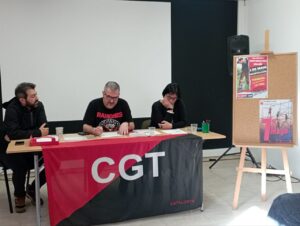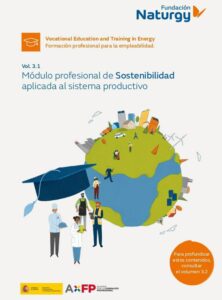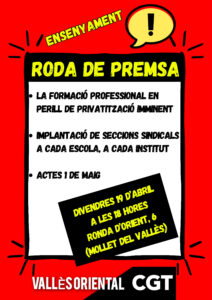El proper curs 2024-2025 és obligat implantar la reforma de la FP que ha impulsat el govern d’Espanya. Existeixen molts punts sense concreció que suposen incerteses i neguits. Parlem una mica dels principals aspectes preocupants, com són:
– Reducció de les hores de formació reglada i baixada generalitzada de la qualitat de la formació.
– Ampliació de les hores de pràctiques que per mantenir la durada de 2 anys s’ha fet a costa de la formació reglada
– Precarització de la feina dels alumnes a les empreses, tot i que es suposa que es cotitzarà les pràctiques a la seguretat social.
– Privatització manifesta de la formació professional ja que una bona part de la formació es confia a empreses privades.
Reducció de les hores de formació
La reducció d’hores lectives a l’institut suposa una baixada de la qualitat de la formació per a l’alumne, ja amb prou carències de coneixements. Escurça cada cop més el seu temps de preparació enfront de la que serà la seva llarga futura vida laboral i personal.
Desapareixen totalment els continguts, que abans indicaven els mínims que s’havien d’impartir a tot el territori i eren una garantia per poder homologar els estudis i assegurar una formació igualitària. Ara només s’avaluen RA=Resultats d’aprenentatge. Es produeix un buidat en els continguts específics de cada ofici que fa que l’alumnat arribi a l’empresa amb menys coneixements elementals per desenvolupar la seva carrera, i encara dificulta més que pugui desenvolupar el seu progrés en el mon laboral del seu sector. Això provoca un estancament de les persones i les fa dependents en tot moment de les seves empreses.
Tots els mòduls perden hores de formació específica del perfil professional al centre, en benefici d’altres mòduls que s’ha considerat més importants i que constitueixen fins al 60% de les hores del cicles:
– Una part se’n va a engreixar la DUAL, que acaba constituint entre un 25 i un 50% de les hores totals del cicle.
– Un altra part se’n va a mòduls transversals que es troben a tots els cicles formatius tant de grau mig com superior. Tenint en compte que les hores lectives són unes 25 hores setmanals tenim:
– Anglès tècnic (2 h) 66 h. A Catalunya ja es feia a grau mig, ara s’estén a grau superior.
– Digitalització (1 h) 33 h. Sense discriminar si el cicle ho necessita o no, com pots ser el cas d’informàtica, totalment digitalitzat.
– Sostenibilitat (1h) 33h. Els materials del mòdul s’han encarregat l’empresa privada Naturgy que és la segona o tercera de les 10 empreses que més contaminen a Espanya. https://www.huffingtonpost.es/economia/estas-son-empresas-mas-contaminantes-espana.html
– Mòduls optatius (2 a 3h) 66-99 h. Poden tenir Unitats de competència externes. O sigui, Resultats d’Aprenentatge d’altres cicles formatius.
Coma comentari, es canvia el nom d’alguns mòduls com FOL (Formació i orientació laboral), EIE (Empresa i Iniciativa Emprenedora) i Síntesi (Projecte final de cicle):
– «Itinerari personal per l’ocupabilitat I» (3 h) 99 h
– «Itinerari personal per l’ocupabilitat II» (2 h) 66 h
– «Projecte intermodular de 198 hores»
Un altre efecte serà la disminució de la plantilla de professorat a curt, mig i llarg termini. A Catalunya s’assegura que no afectarà les plantilles, al menys el primer any, ja que es vol substituir l’equivalent en hores acadèmiques suprimides, per càrrecs d’observador, de visitador casual de les empreses i comercial de projectes. Això desnaturalitza la feina docent que li és pròpia, per anar-lo substituint i segurament eliminant.
No es garanteix que les hores de professorat puguin mantenir-se en un futur i és clarament on es poden fer les retallades que han de venir. Sembla una manera infal·lible de solucionar el dèficit de professorat que s’està produint en els cicles de FP en els darrers anys.

Ampliació de les hores de pràctiques
Com s’ha dit abans, una gran part de les hores perdudes de formació van a DUAL:
– DUAL és el nou nom que posa el govern d’Espanya al que abans eren les pràctiques sense remunerar o FCT=Formació en centre de treball.
– Dual general (SENSE REMUNERAR): del 25% a 35% de les hores (de 500 a 700 h). A Catalunya es faran 515 h.
– Dual intensiu (REMUNERAT al mínim): del 35% al 50% (de 700 a 1000 hores del cicle), amb contracte de DUAL. A Catalunya 713 h (dual general+projecte intermodular).
L’increment de les hores de pràctiques a empreses planteja problemes en trobar llocs addicionals on poder fer la DUAL amb garanties.
– També en poder dur a terme la consecució d’aquestes en els terminis establerts.
– A més propicia l’augment de les tasques burocràtiques i administratives i en dificulta les de control per part del professorat.
Per una altra banda, la gran majoria de les empreses participants en el nou model, no podran assegurar prou tutorització i que l’aprenentatge aconseguit no sigui parcial, específic, i destinat a la consecució urgent de les necessitats de cada companyia. No creiem que l’alumnat aprengui el mateix a l’empresa que a l’escola i, per tant, no es poden substituir unes hores per les altres.
S’obliga literalment a començar la DUAL en empresa al primer curs amb la qual cosa:
– Hi ha una manca de formació de l’alumne per començar les pràctiques.
– S’estableix una competència ferotge entre alumnes de FP Inicial, grau mig i grau superior. Els alumnes de nivells inferiors, sobretot la FP Inicial, tindran molt difícil fer les pràctiques enfront els de nivells superiors.
En moltes poblacions no existeixen empreses que puguin absorbir tantes hores de pràctiques.
– Al final, es veu venir la creació de solucions miraculoses com ara muntar projectes a corre-cuita amb els alumnes que no es puguin col·locar.
– Hi haurà molts alumnes que no podran acabar el cicle en 2 anys, durada que s’han entestat en mantenir.
Avaluació «conjunta» Institut i Empresa
Com que el Resultats d’Aprenentatge que no es poden fer a l’institut les ha de fer i avaluar l’empresa, caldrà professionals qualificats a les empreses per a poder fer la formació, el seguiment i l’avaluació dels alumnes, que són per ells, els aprenents.
Així els «tutors» d’empresa han d’avaluar les RA’s «transferides» i:
– A cada mòdul l’empresa posarà un 10% de la nota.
– Els alumnes poden no desenvolupar totes les RA ja que depenen de l’empresa en concret en la que fan les pràctiques.
No hi ha garanties legals ja que ni els tutors d’empresa ni les empreses, no tenen cap mena de:
– requeriment de formació com els professors que han de ser enginyers.
– control per l’administració com els professors que tenen inspecció d’ensenyament.
– sancions en cas d’incompliment com els professors que poden rebre sancions o expedients.
Es produeix l’efecte que fins que l’empresa no hagi posat la seva qualificació, l’alumne no te aprovat el mòdul corresponent. O sigui, que fins que no s’hagi acabat l’estada en empresa, no tindrà qualificació del mòdul. Per tant:
– Es desconeix què passarà amb les beques, ja que depenen de les notes de l’any anterior.
– Els tutors d’empresa normalment avaluen per indicis, no hi ha cap procediment específic ni objectiu.
Privatització de la FP
S’ha començat a detectar una tendència dels centres concertats a oferir pagament per cada alumne que incorpori per a les pràctiques. D’aquesta manera, els diners públics tornaran a finançar les empreses privades per mantenir una il·lusió de col·laboració d’aquestes.
El cas extrem es troba en que empreses multinacionals estan oferint els cicles formatius de FP de forma totalment privada o concertada amb pràctiques que es fan a les seves pròpies instal·lacions. D’aquesta manera, ja fan la selecció de personal en el moment de la formació i segreguen l’alumnat d’entrada.

Conseqüències
Les principals conseqüències d’aquestes polítiques:
– Hi ha una baixada de la qualitat de la formació per a la persona, ja amb prou carències de coneixements. S’escurça cada cop més el seu temps de preparació enfront de la que serà la seva llarga futura vida laboral i personal.
– Es buida els cicles professionals de continguts específics de cada ofici. Això fa que les persones arribin a l’empresa amb menys coneixements elementals per desenvolupar la seva carrera, i millorar la seva qualificació i possibilitats de progressar en el seu sector.
– Les empreses participants, en general no poden assegurar prou tutorització i que l’aprenentatge aconseguit no sigui parcial, específic, i destinat a la consecució només de les necessitats de cada companyia.
– No existeixen controls ni sancions per les empreses que no compleixin els convenis de DUAL. La formació queda en mans de tutors de les empreses dels que no es requereix un mínim de qualitat i formació prèvia com si que es fa amb els docents de la FP. Les perjudicades són les persones en formació.
– No són pocs els casos en que empreses validen com a equivalent de la formació qualitativa que abans feien professionals docents activitats habituals de les «pràctiques» com escombrar o fer fotocòpies. No són tots els casos però sí una majoria, i amb tota la impunitat.
– Les persones en pràctiques es converteixen en mà d’obra gratuïta o precària, ja que no existeix remuneració en la DUAL. I les persones en DUAL intensiva es converteixen en mà d’obra barata, però exigint com si fos personal professional. La remuneració amb prou feines arriba a 300 € mensuals.
– I per acabar, es produeix una privatització de facto en la FP amb empreses que ofereixen la formació i pràctiques per aconseguir uns treballadors dòcils i amb les destreses mínimes necessàries per a la seva especificitat.


CONSTITUÏM SECCIONS SINDICALS ALS CENTRES EDUCATIUS:
Al Vallès Oriental els treballadors i treballadores del sector d’ensenyament afiliades al sindicat CGT potenciem l’organització en seccions sindicals de centre de treball.
Les seccions sindicals són l’eina bàsica d’organització dels treballadors i estan poc esteses en els centres educatius a diferència de qualsevol altra empresa, on son una organització habitual.
Les seccions sindicals possibiliten l’organització i participació directa real i autònoma dels i les treballadores de cada centre de treball per actuar, negociar i millorar les condicions laborals, de seguretat i higiene particulars del centre de treball. Un exemple podrien ser els problemes amb les calefaccions i climatitzacions del centre en particular, que se sap ben cert que no es solucionaran a les taules de negociació externes a la realitat del centre.
La constitució de la secció sindical no és complicada i requereix de la participació de al menys dues persones afiliades. La documentació es lliura al departament de Treball i es comunica de forma oficial al centre de treball si es vol. A partir d’aquest moment, es te el suport del sindicat i és possible inclús convocar vagues locals al centre de treball.
Un cop constituïda la secció, el sol fet de la seva existència fa que les direccions dels centres educatius es plantegin les seves decisions que afecten els treballadors i treballadores del centre. Es pot iniciar converses per aconseguir que se’ns reconegui com a interlocutors vàlids i se’ns comuniqui les decisions que es prenguin i tinguin incidència sobre les condicions laborals dels treballadors.
Per últim, comentar que els nostres companys i companyes d’altres centres del Vallès Oriental, com l’institut Carles Vallbona de Granollers o l’ISMD de Mollet del Vallès també han constituït seccions sindicals per mirar de fer habitual aquest dret a tots els centres.










